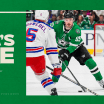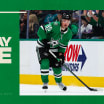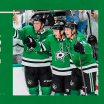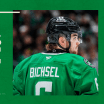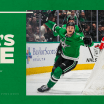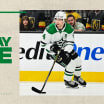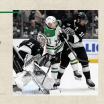A lost season isn't like driving down a road and taking one wrong turn.
For the 15 teams that aren't preparing for the playoffs this week, the path that led them away from that single-most important goal of any team at the start of a season took many twists and turns -- down cart paths, into ditches and far away from the straight and narrow.
It is so for the Dallas Stars, who began the season as one of the most improved teams in the NHL and a favorite of many observers not just to make the playoffs but to be a contender, but whose season collapsed during an eight-game winless streak during a critical stretch in late March.
Burnside: What went wrong for Stars in 2017-18?
From key injuries to secondary scoring issues, several factors kept Dallas out of the playoffs
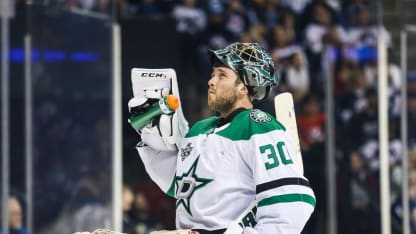
"It's tough; very disappointing," captain Jamie Benn said Monday as the team met with the media for the last time before the offseason.
"For most of the season, I thought we were sitting pretty good position, and a month goes by and then you're out of a playoff spot. Obviously, a tough day here for us."
As Tyler Seguin noted, if it was just one thing that happened, they wouldn't be standing here.
"It's going to take some time to get over this," he said.
So, were all of those observers -- including this one, who imagined long ago in September a Stars season that ended in a Western Conference final against the Edmonton Oilers, another team now coming to grips with a colossal letdown having finished out of the playoffs as well -- completely misguided?
No. Not completely. But it's clear that the optimism that carried from a busy offseason and into training camp and the start of the season was misplaced, and certainly that optimism was undercut by a series of unforeseen circumstances.
Here are five things that happened to the Stars that prevented them from making good on that optimism.
1. Bitten hard by the injury bug
We'll start with the injuries because it's the lamest excuse for any team that doesn't make the playoffs. In fact, general Jim Nill said that very thing early in a long conversation about the season.
"There's injuries, yeah, but you still got to find a way and we didn't do it," Nill said.
And it's true.
Every team suffers injuries. Every team soldiers through -- or at least the ones that make the playoffs do. Look at Boston or Winnipeg or Colorado and so on. Those teams were rocked by injury to key personnel and are still playing hockey.
But there's, likewise, no doubt the injuries to key personnel at key times had a ripple effect that was a major contributor to the Stars' downfall.
Let's start with Martin Hanzal, who was signed to a three-year deal worth $14.25 million in the offseason in spite of a history of injury issues and, specifically, back issues. He didn't make it out pre-camp skates without suffering an injury and then missed time eight different times before he left the lineup for good in late February, opting for spinal fusion surgery in early March.
Hanzal ended playing just 38 games, scoring just five goals and finishing a minus-14.
Even hampered by injury when he was playing, Hanzal's impact on the lineup was pronounced. He takes key draws at both ends of the ice and is a strong net-front presence on the second power-play unit. He's a key member of the penalty-killing corps. And the guys in the Stars' room loved him.
Without him, the ripple effect was pronounced as Seguin and Benn both ended up spending far more time killing penalties than they would have otherwise.
Losing Marc Methot to a knee injury on Nov. 10 also had a negative ripple effect as he played in only one game between then and Feb. 16. The veteran defenseman, who played so well with Erik Karlsson in Ottawa last season when the Senators were a surprise Eastern Conference finalist, then missed five of seven games, including the last four of a critical four-game road trip in March after suffering a nasty cut blocking a shot.
Methot is a key penalty-killing and physical force. His ongoing absence put more pressure on the Stars' de-facto shutdown pair of Greg Pateryn and Dan Hamhuis, who seemed worn down by the time the stretch run rolled around.
And finally, losing starting netminder Ben Bishop to a left knee injury during the team's stretch run put too much pressure on backup Kari Lehtonen at a critical juncture of the season.
With Bishop healthy, Lehtonen rose to the occasion playing periodically and turned in some terrific performances throughout the season. But as "the man," Lehtonen finished with a 3-8-2 record in March and it simply wasn't good enough.
It's simple math. The Stars finished three points out of eighth place in the Western Conference. If just one of these players avoids injury, the Stars are a playoff team.
2. Depth scoring
At the start of the season, given the opportunities that were afforded to the group of players that would make up the middle of the forward corps, it wouldn't have been out of line to suggest the following in terms of goal production: Brett Ritchie 20 to 22, Devin Shore 20, Mattias Janmark 20 to 25, Antoine Roussel 15 and Jason Spezza 20 to 25.
Those players represent the middle class of the Dallas lineup, and with any team, they are critical to taking the heat off Seguin, Benn and Alexander Radulov, who combined for 103 goals.
The aforementioned group combinedfor a total of just 31 goals -- and 19 of those were scored by Janmark, who missed all of last season with a knee injury. That's conservatively 60 fewer goals than should have been produced by that depth group of forwards.
How many additional goals did the Stars need to make the playoffs, given that they finished just three points back of eighth-place Colorado? Ten? Fifteen?
We'll give Janmark a pass since he was coming off a 2016-17 season lost to knee surgery, although he did struggle down the stretch, scoring just twice in his last 17 games. But the disappointing production from Ritchie, Shore, Roussel and Spezza, along with youngsters Remi Elie, Gemel Smith and Jason Dickinson -- combining for just 12 goals in more limited roles -- was a defining factor to the team's failure to make the playoffs.
Now, you can quibble about whether a player like Spezza was given enough opportunity to succeed. Would he have been closer to 20 goals if he'd been given more chances to play with top players like Seguin, Benn and Radulov? Or was he moved up and down the lineup because he wasn't producing, and head coach Ken Hitchcock was desperate to find scoring to help keep his team in the race?
"I go back to it. It's funny how from up to Game 50, we were in the top nine in scoring in the league. By Game 60, we were still 12th, 13th -- and all of a sudden we dropped off 18th, 21st," Nill said of his team's scoring, which settled in at 18th overall.
"Why for 50 or 60 games are you in the top-third of the league? What happened? That's something we got to figure out."
"That's where we got to sit down. We've got to analyze some of the situations people are put in -- is it the right situation? The wrong situation? Did they under-perform when were they given that chance?" Nill added. "That's what we got to sit down, figure out."
3. The trade deadline
The Stars were among a handful of teams that made no moves at the trade deadline.
There are a number of factors that contributed to that decision, not the least of which was the high asking price for top trade assets like Rick Nash and Ryan McDonagh. And there was a determination by Nill and his staff that the asking price, combined with a desire to keep his young assets and draft picks in house, left him with the status quo.
Given how close the Stars were and how desperate they were for offensive contributions down the stretch, especially during a soul-crushing, eight-game winless streak (see below), in hindsight, adding an asset or two would almost certainly have pushed the team into the top eight, especially when considering how some of the younger players struggled with the pressure of the stretch run.
Top center prospect Jason Dickinson was brought up permanently (or at least until the Stars were eliminated from contention a week ago) after the Hanzal injury. But he struggled, failing to score a single goal in 27 games while adding just two assists.
Elie, with the team all season, scored six times. Smith was in and out of the lineup and collected six goals. Other players in the AHL like Denis Gurianov and Roope Hintz never appeared in a Stars game.
In hindsight, the San Jose Sharks hit trade-deadline gold in acquiring Evander Kane from Buffalo for second- and fourth-round draft picks (unless San Jose re-signs him, in which case the second-round pick becomes a first-round pick). That is a modest payment for a player that scored nine times and added five assists in 17 games in San Jose.
The perennially underachieving Thomas Vanek popped in seven goals and added eight assists for playoff-bound Columbus, which gave up veteran Jussi Jokinen and Tyler Motte.
Patrick Maroon, a big man used to playing with top talent in Anaheim and Edmonton, went to New Jersey for a third-round pick and a prospect, who was a sixth-round pick and helped the Devils to an unexpected playoff berth with 13 points and 17 games.
Not all the available forwards lit it up. Michael Grabner, a speedy two-way forward with good offensive skills, went to the Devils as well for a second-round selection and a Russian prospect playing in the KHL. Grabner, who was the leading scorer at the time in New York, had only five points with the Devils, but he'll still be playing postseason games.
"We looked hard, and in the end, there was nothing there for us to add at the price we were willing to pay," Nill said.
"You set out and what we were trying to get. There was a couple of deals we almost had done actually before the deadline and they didn't work out. But in the end, when we got down to what we were trying to do, the prices -- what we were going to have to give up -- you have to be very careful."
Still, at a time when the Stars needed help from somewhere to jumpstart the offense, they didn't get it from anywhere, even though, in hindsight, the price for outside help acquired by other teams didn't appear that steep.
4. Top-producing players maxed out
The ripple effect of not getting depth scoring from within and not adding depth scoring was that as time passed and the team started to waver, the Stars' top players had nothing left to give.
Seguin -- perhaps the team's most improved, most important player -- was consistently over 22 minutes per night in ice time, including manning every top power-play unit and being one of the team's top four penalty killers. He had two goals in his last 10 games.
Radulov seemed to hit a wall in March, which, perhaps, isn't that surprising, given the frenetic pace at which he played every game, scoring just twice in his last 13 games -- although he did add 10 assists over that time, along with taking a handful of ill-timed penalties.
Benn struggled at times to stay in a groove, juxtaposing timely scoring and elite offensive play along with stellar penalty killing against seemingly indifferent play and bad penalties. He scored one goal in 14 games from early February to early March, although he did finish with two hat-tricks in his last three games after the Stars had been eliminated from contention and ended up with a commendable 36-goal, 79-point tally for the season.
John Klingberg, who led all NHL defensemen in points for most of the season, was called upon on a nightly basis to play 25 to 30 minutes, including a high percentage of all Dallas power-play minutes. Only John Carlson of Washington logged more power-play time during the regular season than Klingberg.
The smooth-skating defender was one of the team's most improved players this season. But he, too, seemed weary by the end of the regular season with all the demands put on him.
5. The 'road trip from hell'
In some ways, the franchise-record eight-game winless streak that precipitated one of the greatest collapses of a playoff-bound team since the 2004-05 lockout was a microcosm for all of the aforementioned ills and issues that plagued the Dallas Stars, starting with their inability to find success on the road -- something that Hitchcock pointed to Monday as one of the key areas that has to be addressed moving forward.
Even now, it remains shocking to consider how this all unfolded.
After a nice come-from-behind win over Anaheim at home left the Stars with a 38-24-6 record on March 9, they set out on a six-game road trip pretty much assured of a playoff spot. At the time, they would have had little inkling that when they returned home, their season would be on life support.
And it wasn't just going 0-4-2, it was the manner in which the Stars frittered games and points away.
They could not take advantage of a sloppy Penguins team relying on minor league netminder Casey DeSmith and fell 3-1 in the first game.
Two nights later, the Stars giftwrapped a win for a stumbling Montreal Canadiens team that was missing a bevy of key players and coming off a miserable road trip of their own.
The following night in Toronto, Lehtonen misplayed a puck in the opening moments and Nazem Kadri scored as the Leafs quickly built a 2-0 lead. But the Stars got rare depth scoring and went ahead 4-2 going into the third, allowed the Leafs to tie and then went ahead again on a Brett Ritchie goal. But it wasn't enough. The Leafs tied the game with 15.3 seconds left and the Stars couldn't score on the power play in overtime, losing in a shootout.
They managed to lose to Ottawa in overtime for the second time in less than two weeks. They gave up a power-play goal with less than a second to play in the first period en route to another loss to Winnipeg. They yielded the winner late in the third period at Washington on a Carlson shot.
Zero wins. Two points. Chances to win -- or at least get points -- in all six games on the trip.
Then came the game that was the emotional killer for the Stars.
In their first contest at home, the Stars built a 2-0 lead going into the third before allowing three Bruin goals, including the winner with 11.1 seconds left in regulation for a 3-2 loss.
Two days later, Lehtonen allowed a miserable Jake Virtanen goal from a bad angle and they lost for the second time in a row at home to lowly Vancouver, 4-1. And it was, for all intents and purposes, over.
A franchise-worst eight-game winless streak. A streak when every mistake seemed to be a critical one and where no one in the Stars lineup seemed capable of being the player that made it end.
Until it was too late.
"We seemed to lack the confidence to win the games down the stretch," Spezza said as the Stars cleaned out their lockers, went for end-of-season physicals and began the meeting process with management.
"It's a like a little bit of an avalanche. The snow starts to go and you think, well, it's not going to be a big avalanche," Nill said. "We couldn't stop it. It kept going, and before you know, it it's two games -- it's four games, it's six games. All of a sudden, we are where we are today. And we kept saying, 'we win tonight and then get us going and we can get on a three-game winning streak.'
"It didn't happen. That's the disappointing part. We didn't find a way to stop the snow slide, and why is that? That's what we have to figure out."
This story was not subject to the approval of the National Hockey League or Dallas Stars Hockey Club.
Scott Burnside is a senior digital correspondent for DallasStars.com. You can follow him on Twitter @OvertimeScottB, and listen to his podcast.


